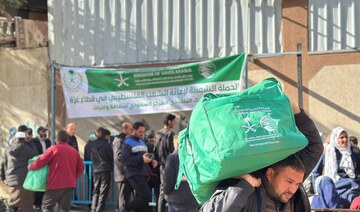ANKARA: Turkey has shown unexpected restraint after US President Joe Biden formally recognized the 1915 massacre of Armenians as genocide by so far avoiding the deployment of rebellious or bellicose rhetoric against its NATO ally.
Turkey maintains that the killing of Armenians was not systematically orchestrated and that they died in wartime conditions, leaving the government with two options after Biden’s Saturday statement.
Either it can continue to be cautious and dodge a diplomatic crisis with the US at a time when the Turkish lira is depreciating against the dollar, or it can move further into Russia’s orbit and risk seriously damaging relations.
Turkey’s reaction is a test for the future of bilateral ties, which are already strained because there is no major support for the country within the US establishment.
Biden also delayed his much-awaited telephone conversation with President Recep Tayyip Erdogan until April 23.
“Once the Pentagon was Turkey’s biggest supporter inside the US government, now it turned to be Turkey’s biggest adversary in Washington,” Soner Cagaptay, an academic from the Washington Institute for Near East Policy, told Arab News. “Now Erdogan needs the US more than he thinks Washington needs him. Biden therefore is seizing this opportunity.”
Turkish Foreign Minister Mevlut Cavusoglu criticized the US statement. “We have nothing to learn from anybody about our own past,” he tweeted. “Political opportunism is the greatest betrayal to peace and justice. We entirely reject this statement based solely on populism.”
The ministry urged Biden to correct this “grave mistake” that had no legal basis, was not supported by any evidence and had “caused a wound that was difficult to repair.”
But Turkey did not call for its newly arrived ambassador in Washington, DC, Murat Mercan, for consultation. Nor did it table the possibility of retaliatory action, like restrictions on the use of Incirlik air base by US forces.
However the US ambassador to Turkey, David Satterfield, was summoned on Saturday night following the statement so that Ankara could condemn it.
Ozgur Unluhisarcikli, Ankara director of the German Marshall Fund of the United States, said that Biden’s statement was seen by most Turks as singling out the country with a double standard approach that would have long-term consequences for perceptions toward the US.
“On the other hand one could also argue that anti-Americanism in Turkey is already as bad as it can get,” he told Arab News.
HIGHLIGHTS
• Turkey maintains that the killing of Armenians was not systematically orchestrated and that they died in wartime conditions, leaving the government with two options after Biden’s Saturday statement.
• Either it can continue to be cautious and dodge a diplomatic crisis with the US at a time when the Turkish lira is depreciating against the dollar, or it can move further into Russia’s orbit and risk seriously damaging relations.
Unluhisarcikli said the government could create real consequences for the US by dragging its feet in the Afghanistan peace process, making unilateral incursions to northeast Syria or closing Incirlik air base to US flights.
“However, the low-profile response by the government suggests that Turkey may not choose to or cannot afford to pick another fight with the US right now.”
Turkey-US relations have been in decline over a range of issues such as Turkey’s purchase of the Russian S-400 air defense system, policy divergence in Syria, the country’s human rights record and an ongoing US court case targeting Turkey’s state-owned Halkbank for evading Iran sanctions.
Turkey was also removed from the US F-35 fighter program’s new contract because of the S-400 system.
Biden’s declaration followed a nonbinding resolution by the US Senate in 2019 recognizing the Armenian killings as genocide.
Richard Giragosian, director of the Yerevan-based Regional Studies Center, said although Biden’s statement had no legal or even policy implications for Armenia, it did extend significant credence and political capital to the Armenian quest for recognition and reassurance.
“It may also help Turkey to begin to more sincerely deal with its own troubled past and help to end the counterproductive state policy of genocide denial by the Turkish government,” he told Arab News.
Giragosian said the statement made the genocide issue less confrontational for Turkey and offered a fresh opportunity for it to reengage in earlier diplomatic efforts with Armenia to “normalize” relations.
“As Turkey no longer has either justification or motivation to keep its border with Armenia closed, as the war ended with a victory for Turkish-backed Azerbaijan, there is a potential positive aspect of the new post-war reality in the South Caucasus region.”
But Unluhisarcikli believed that normalization was not completely tied to Biden’s statement.
“Some argue that Biden’s statement has made Turkey-Armenia normalization more difficult. In reality, normalization between the two countries is linked to a permanent peace treaty between Azerbaijan and Armenia in which the two Caucasus countries acknowledge their respective international borders,” he said.



























